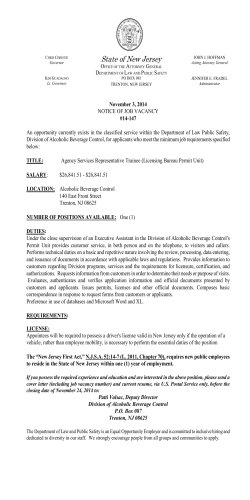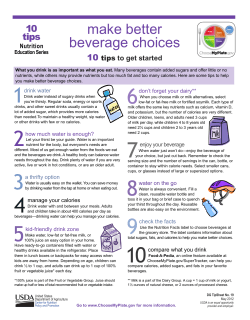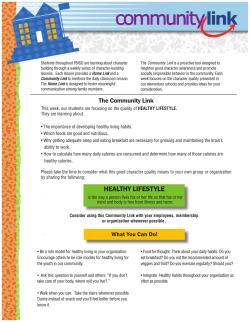
Consumers have the right to know what they are drinking
Consumers have the right to know what they are drinking Letter sent to the Commissioner Vytenis Andriukaitis on 10 February 2015 (Ref. BEUC-L-2015-035/MGO/cm) Contact: Ilaria Passarani – [email protected] Ref.: BEUC-X-2015-011 - 10/02/2015 BUREAU EUROPÉEN DES UNIONS DE CONSOMMATEURS AISBL | DER EUROPÄISCHE VERBRAUCHERVERBAND Rue d’Arlon 80, B-1040 Brussels • Tel. +32 (0)2 743 15 90 • Fax +32 (0)2 740 28 02 • [email protected] • www.beuc.eu EC register for interest representatives: identification number 9505781573-45 Mr. Vytenis Andriukaitis Commissioner for Health and Food Safety European Commission Rue de la Loi 200 B – 1049 Ref.: BEUC-L-2015_035/IPA/cm Brussels Brussels, 10 February 2015 Re: Consumers have the right to know what they are drinking Dear Commissioner Andriukaitis, I’m writing to you on behalf of the European Consumer Organisation (BEUC) to urge the European Commission to adopt with no further delays the report on the application to alcoholic beverages of the information requirements set up in the Regulation on the provision of food information to consumers. According to Article 16 of the Food information Regulation (EU) No 1169/2011 the European Commission was expected to adopt by 13 December 2014 a report evaluating whether alcoholic beverages should in future be covered by the requirement to provide information on ingredients and nutritional content, and the reasons justifying possible exemptions, taking into account the need to ensure coherence with other relevant Union policies. The Commission was also expected to propose a definition of “alcopops”. At present consumers can have complete information about what is in a bottle of milk or fruit juice, but not a bottle of whisky or beer. We consider this unacceptable. BEUC cannot see the reasons why alcoholic beverages should be treated differently from other beverages and exempted from the information requirements foreseen in the Food Information Regulation (EU) No 1169/2011. Providing consumers with adequate information enables them to make informed choices. In particular, providing consumers with nutritional information such as energy content allows consumers to better monitor their diet and maintain healthiness. This principle applies to all foodstuffs, including alcoholic beverages. The full list of ingredients - including additives and preservatives - and displaying nutritional information should be mandatory for all alcoholic beverages in order to help consumers make informed choices about what and how much to drink. The role that alcohol plays in nutrition and obesity is often overlooked. Alcoholic drinks are made by fermenting and distilling natural starch and sugar. Therefore they are high in sugar and contain a considerable level of calories 1. For instance our Belgian member Test-Achats found that a small porto (75ml) contained 8,1 grams of sugar, so as much as some flavoured milk drinks, while alcopops could contain up to 21 grams of sugar, almost the same as sugary drinks. High volume intake can significantly contribute to weight gain and obesity. Studies conducted in the UK indicated that alcohol accounts for nearly 10% of the calorie intake amongst adults who drink2. Yet, few consumers know that one gram of alcohol contains seven calories, a large glass of red wine (13% alcohol) has 170 calories and an average half litre of beer (5% alcohol) has about 220 calories – comparable to a chocolate bar. Displaying accurate nutritional information on the bottle is essential to make sure consumers can make informed choices about the amount of alcohol they want to consume. Moreover, there are significant differences in the nutrient profiles as well as in the percentage of alcohol by volume (ABV) and non-alcohol ingredients among the different types of alcoholic beverages and also among different brands of the same product. Therefore, providing the list of ingredients and the nutritional information can facilitate comparison and choice between alcoholic drinks. Studies on wine back labels show that the label is considered an important source of information when making purchases3 . In some countries like USA, Brazil, Canada, China, India, Mexico, New Zealand, Russia, Switzerland it is mandatory to provide the list of ingredients in alcoholic beverages while European consumers still do not have access to this information despite Europe being the region with the highest consumption of alcohol per capita in the world, some of countries having particularly high consumption rates4 . We ask the European Commission a strong commitment to improve consumer information on alcohol and to swiftly adopt the above mentioned report as well as a definition of alcopops. We remain at your disposal should you or your services wish to discuss this further. Yours sincerely, Monique Goyens BEUC Director General 1 2 3 4 Test-Santé n.108, May 2012. Bates B, Alison Lennox, “Obesity and Alcohol: an overview”, National Obesity Obesity Observatory, NHS, 2012. Mueller s. et al. (2010)” Message in a bottle: the relative influence of wine back label information on wine choice. Journal of Food Quality and Preference, Vol.21. Global status report on alcohol and health, World Health Organization, 2014. 3
© Copyright 2026


















